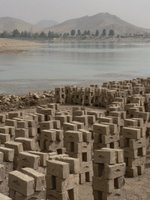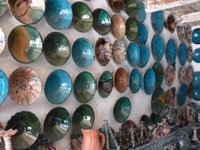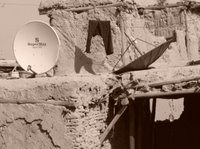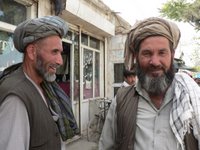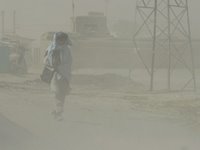 Some days ago there were rumors going around Kabul about another “successful” operation near Kandahar: lots of civilians had been killed again. First it seemed that NATO agrees to take responsibility for couple of deaths. But now they accept officially that they have been killed 12 innocent persons. But afghans talk about
Some days ago there were rumors going around Kabul about another “successful” operation near Kandahar: lots of civilians had been killed again. First it seemed that NATO agrees to take responsibility for couple of deaths. But now they accept officially that they have been killed 12 innocent persons. But afghans talk about 30-80 deceased.
30-80 deceased.Next morning we decide with Andres’s colleague Stephen to go to the Kabul Zoo. I am a little bit frightened about the last news. Maybe some citizens of Kabul will take revenge on us? Fortunately it seems that nobody looks angrily at us. At least not in open.
I enter the zoo with some prejudices, because I have heard sad stories
 about Kabul Zoo. Reality seems sunnier: the old and uglier part of zoo is in ruins. Last summer we visited Riga Zoo in Latvia. The gardens look quite similar. Lions, bears, macacos and antelopes live in a large slab of land surrounded with water. Old star of Kabul Zoo, lion Marion, is now dead. But instead there is couple of new lions. Six bears climb on stumpy logs.
about Kabul Zoo. Reality seems sunnier: the old and uglier part of zoo is in ruins. Last summer we visited Riga Zoo in Latvia. The gardens look quite similar. Lions, bears, macacos and antelopes live in a large slab of land surrounded with water. Old star of Kabul Zoo, lion Marion, is now dead. But instead there is couple of new lions. Six bears climb on stumpy logs.I was a dedicated aquarium keeper at home. Before we arrived to Kabul I sadly gave away my old scalars. It is nice to see the new aquarium house in the zoo: the aquariums seem to be clean and tropical fish are in good condition.
It was a chaos in Riga Zoo. It seemed that every person packed some kilos of sausages in their bags to be hurled at lion. Nobody feeds animals here; they seemed to be more relaxed and
 follow their normal habits.
follow their normal habits.It is Friday, last day of long Eid holidays. Officially Eid lasted for three days, but nobody worked on Thursday either. There are lots of families at the zoo. It is interesting to see that some women raise their burkas to have a better look at the animals. Some patrons ask me to take photos of their children, who are smartly dressed. There is other
 entertaiment as well: you can buy coloured eggs to knock against each other in a sort of game. Stephen puts his skills to the test: how to drive a toy car on the mini-rally course.
entertaiment as well: you can buy coloured eggs to knock against each other in a sort of game. Stephen puts his skills to the test: how to drive a toy car on the mini-rally course.One huge swing is installed as well. Stephen and our driver Massoud persuade me to try it. It is a mistake: there is no possibility to fasten itself, there are just some metal benches inside. I grab the metal edge of the swing, press my foot under the next bench and say my prayer not to fall off the swing. Fortunately the flying lasts only for a few minutes. I reel down with shivering feet.



